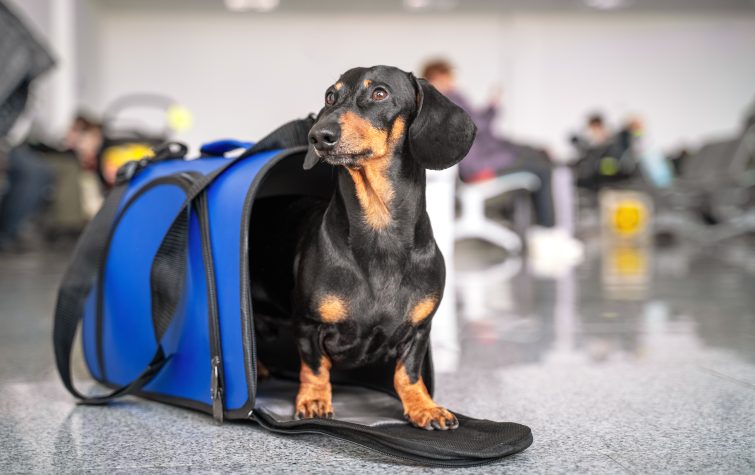Relocating with a Pet? How to Make Your Move Stress-Free and Pet-Friendly

Relocating can be complex, and bringing a pet along adds another layer of complexity to international pet travel. From travel logistics to international regulations, careful preparation can ensure a smooth transition for you and your pet(s). Understanding country-specific requirements early in the process is essential to avoid unexpected delays and complications.
Understand International Pet Relocation Requirements
Every country has its own rules for pet importation. These may include vaccination protocols, microchipping, quarantine periods, and breed restrictions. Researching pet import requirements for your destination is critical to avoid delays or denied entry.
Pet Relocation to Australia
Australia: Australia mandates that pets undergo a rabies vaccination followed by a Rabies Neutralizing Antibody Titre Test (RNATT). The RNATT must be conducted at least 180 days before the pet’s export to Australia, and this waiting period is mandatory.
Pet Relocation to Canada
Canada: Relocating a pet to Canada requires that the pet be accompanied by the necessary documentation, such as a valid rabies vaccination certificate, upon entry.
Pet Relocation to Japan
Japan: Importing pets into Japan requires microchipping, at least two rabies vaccinations, a rabies antibody test, and a 180-day waiting period after the antibody test before entry is allowed. Failure to comply may result in extended quarantine upon arrival.
Working with relocation experts can simplify compliance with these regulations. They stay updated on international pet import rules and can guide you through the necessary steps to ensure a seamless move. These professionals help prevent complications such as denied entry or extended quarantine periods, which can be stressful and costly for pet owners.
Why Use a Pet Relocation Service?
A professional pet relocation company simplifies complex logistics around pet shipping regulations and customs paperwork. They handle everything from veterinary appointments and documentation to booking flights and arranging pet-safe transportation, including pet shipment coordination services that comply with international regulations
Key Benefits:
-
Compliance with international animal import laws
-
Reduced risk of quarantine or denied entry
-
Comfort and safety for your pet during travel
-
Door-to-door pet transport in some cases
Services such as PetRelocation.com and other certified providers offer peace of mind by managing every step of the process. Additionally, if you’re coordinating household goods at the same time, it’s worth reviewing expert advice on how to choose the right household goods mover. Selecting the right partners for each aspect of your move can help reduce stress and avoid delays.
Preparing Your Pet for International Relocation
A smooth move starts with getting your pet ready, physically and emotionally.
International pet relocation checklist:
- Visit your vet: Schedule a checkup to ensure your pet is healthy and up to date on all vaccinations.
- Get a pet health certificate: Most countries require official pet travel documents, including a health certificate signed by a licensed vet, which must be completed by a licensed veterinarian shortly before departure.
- Crate training: Introduce your pet to an airline-approved travel crate early. Start with short periods and gradually increase duration.
-
Comfort items: Pack familiar toys or blankets to help ease anxiety.
-
Exercise before the journey: A tired pet is often a calm traveler.
-
Consider calming aids: Ask your vet about travel-friendly anxiety remedies like pheromone sprays or supplements.
Timing is Everything: Plan Ahead Your Pet’s Relocation
Some countries enforce strict vaccination and quarantine timelines that must be met before you move abroad with pets. For example, in Japan, a pet must wait 180 days after a rabies blood test before entering the country without extended quarantine. These long lead times make it essential for pet owners to begin the process as early as possible.
Coordinating with your relocation provider to determine the best travel window for your pet ensures compliance with international requirements while keeping the transition as smooth as possible. Some countries have specific entry points where pets must arrive, so understanding these details can help avoid unexpected rerouting.
Some airlines limit pet transport during extreme weather conditions, meaning pet owners may need to schedule travel during cooler months or opt for climate-controlled cargo options. Booking flights well in advance helps secure pet-friendly accommodations and avoid last-minute surprises.
Breed Restrictions and Exotic Pet Rules
Some countries restrict certain breeds, and you need to understand these policies before moving. For example, the UK has specific regulations prohibiting breeds like pit bulls, while other destinations may have different guidelines.
Many airlines and countries have restrictions on brachycephalic (short-nosed) breeds, such as pugs and bulldogs, due to their higher risk of respiratory distress during air travel. Special accommodations may be necessary for these breeds, such as choosing airlines with pressurized cargo holds or selecting direct flights to reduce travel time.
Exotic pets, including reptiles and birds, may require special permits and additional documentation. Some countries prohibit the import of specific species or mandate extensive quarantine periods. Consulting with a pet relocation professional ensures that all necessary paperwork and approvals are ready in advance. Birds may require disease testing before international travel, while reptiles may need CITES permits to confirm legal ownership and transport.
Family Support in Pet Relocation
Relocating with a pet involves the entire family, and companies offering relocation benefits should consider including pet transportation in their packages. Many relocation management companies support pet relocation, recognizing that pets are valued family members.
Families should prepare their pets for the transition by maintaining routines and providing comfort items. If a long flight is involved, discussing travel logistics with children can help them understand what to expect and how to help keep their pets comfortable.
Consulting with HR or a relocation management provider about including pet relocation services in your benefits package can help ease the transition and provide additional support during the move. Companies that offer pet relocation assistance demonstrate a commitment to employee well-being, helping employees and their families settle into their new homes more smoothly.
Make Pet Relocation Smooth and Stress-Free
Relocating with a pet requires careful planning, from researching regulations to preparing travel arrangements. By starting early and working with professionals, pet owners can make the process as smooth as possible.
Offering pet relocation support can be a valuable benefit that enhances employee satisfaction and retention. By integrating pet relocation services into relocation policies, companies can help employees navigate international moves , especially when bundled with travel coordination for employee relocation support. For expert assistance, reach out to a relocation management provider who can help you with your pet relocation. Need help relocating your pet internationally? Contact CapRelo today.



